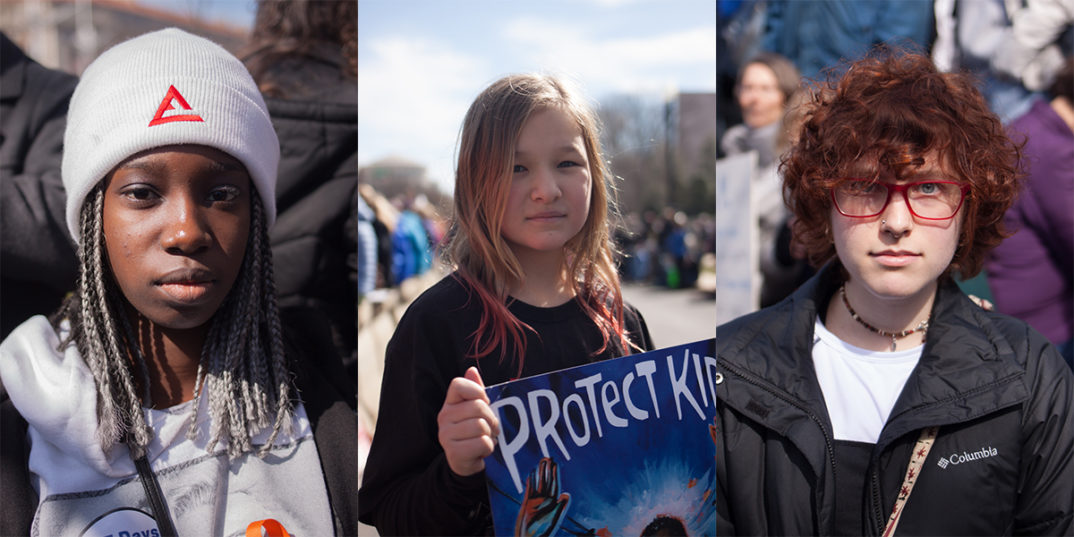In Washington, D.C., A March Against Fear

Reporting by Eleanor Price, Photos by Conner Gordon
On February 14, 2018, a gunman walked into Marjory Stoneman Douglas High School in Parkland, Florida, and shot 17 of his former classmates to death. Six weeks later, the survivors of the shooting led over 200,000 people through the streets of Washington, D.C., to call for gun safety measures at the March For Our Lives. At the time, Congress was in recess; many of the country’s leaders were either back in their districts or overseas, far from the streets where their constituents were demanding change.
Many of the march’s attendees were students themselves, outraged at how routine shootings have become in their schools and neighborhoods. Others had felt the impact of gun violence from afar — a mass shooting on the news, an ever-present worry that they or their families could someday be a target. The people we spoke to gave voice to these fears. But each attendee also made one thing clear: though their leaders may be absent, inaction is no longer acceptable.
Madeline, Washington, D.C.
“It’s been building up over the years. With Sandy Hook, I was in middle school. And I was like, ‘how could this happen?’ And then it kept happening, happening, happening. We are a gun-owning family, so it was kind of like, it was a reevaluation of principles. Now it’s just sort of — it can’t stay the way it is. We are the nation that’s done nothing to solve any of these problems.”
Neil, Virginia Beach, Virginia
“I feel like guns, they have a purpose and they have a place. And I think most of it’s in war. I feel like we shouldn’t bring war home with us, it shouldn’t be in our streets, it shouldn’t be in our schools. It shouldn’t be in places where we want to live and work and be happy.”
 Cilla, Grand Marais, Minnesota
Cilla, Grand Marais, Minnesota
“We are old ladies, grandmothers, and we want to see our grandchildren grow up. Whenever I go back to England, my home, I feel safe. I don’t feel safe here. It’s constant.”
Isabelle, Maryland
“I know that at my school recently, there’s been threats of a shooting, and I know how terrifying being in that situation is. No one should go to school and have to fear their lives, or worry about ‘oh is there a school shooter today?’ That shouldn’t be an issue, especially in schools.”
Rob, Washington, D.C.
“We’ve cared about getting smarter gun legislation passed for a long time, but this past week, my five- and seven-year-old practiced for the first time in their school a shelter-in-place, active shooter drill. Listening to particularly my five-year-old talk about the game that they played, where the whole preschool class was in the bathroom and they had to keep the lights off and the doors closed….She’s smiling and talking about how they did it, they won the game. That was a lot.“
Genevieve, Potomac, Maryland
“I think we should protest as much we can against anybody who allows guns and gun violence in this country.”
“I actually lived right down the street from Stoneman Douglas. And aside from that, I work in schools in Southeast D.C., where it is the most impoverished community in D.C. I’m here for my kids because they’re going to have to face this their whole lives. And I’m done with the guns. I’m done with them.”
Evan, St. Louis, Missouri
“It is shameful that anybody would put their right to fire a semi-automatic above my right to live. And while I may not feel personally scared, it’s not right to ever feel scared when you go to school.”
Carlos, Houston, Texas
“I grew up years and years ago in violent communities in San Antonio, Texas, so I’m well aware of losing loved ones, especially people you went to school with. So everything about this really touches me, deeply.”
Deana, Jacksonville, Florida
“A lot of people think we’re just going to quit because we’re teenagers and they think that our attention spans are so small. But we won’t quit. And I feel like as long as we keep that momentum going, we can really make a big change.”













